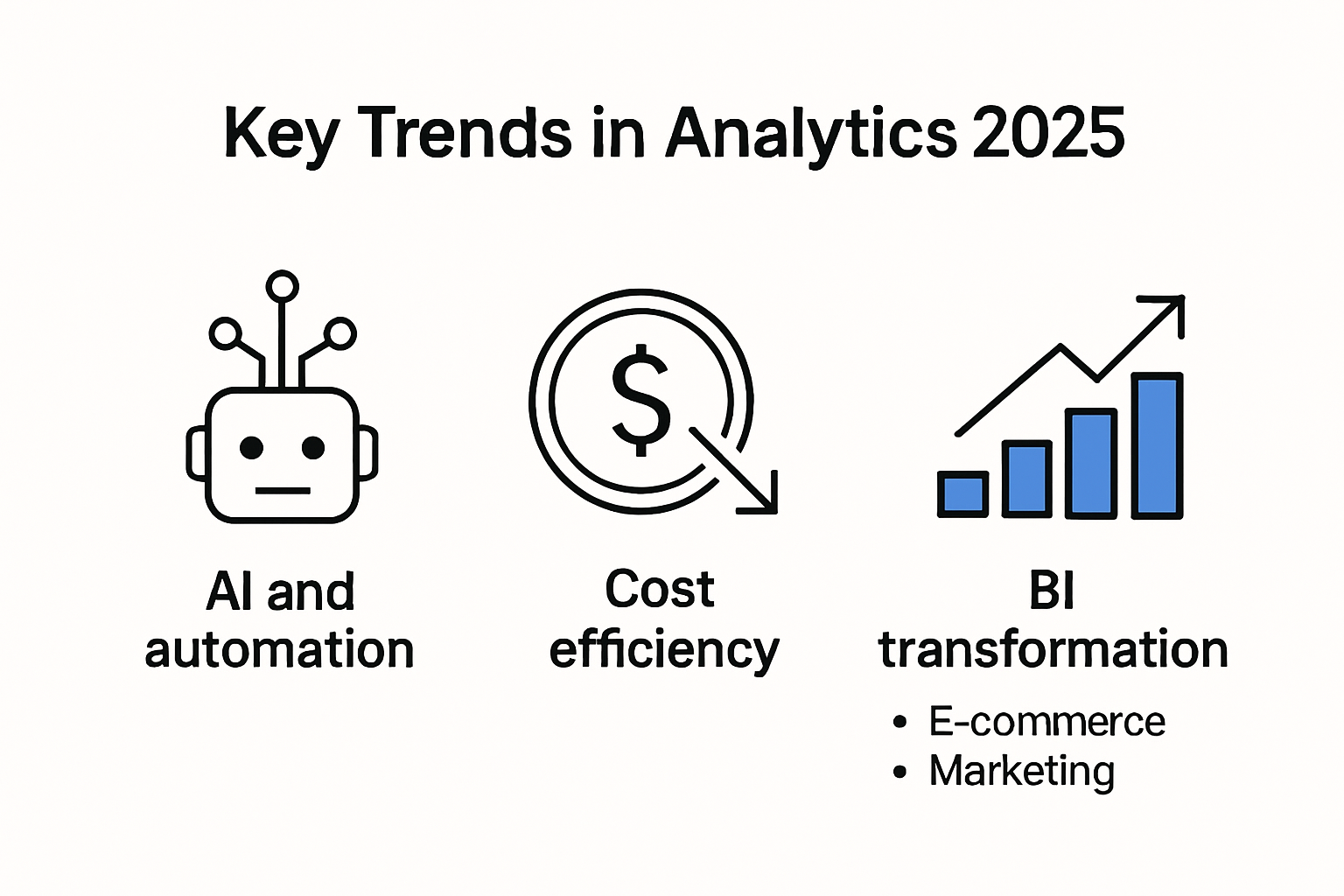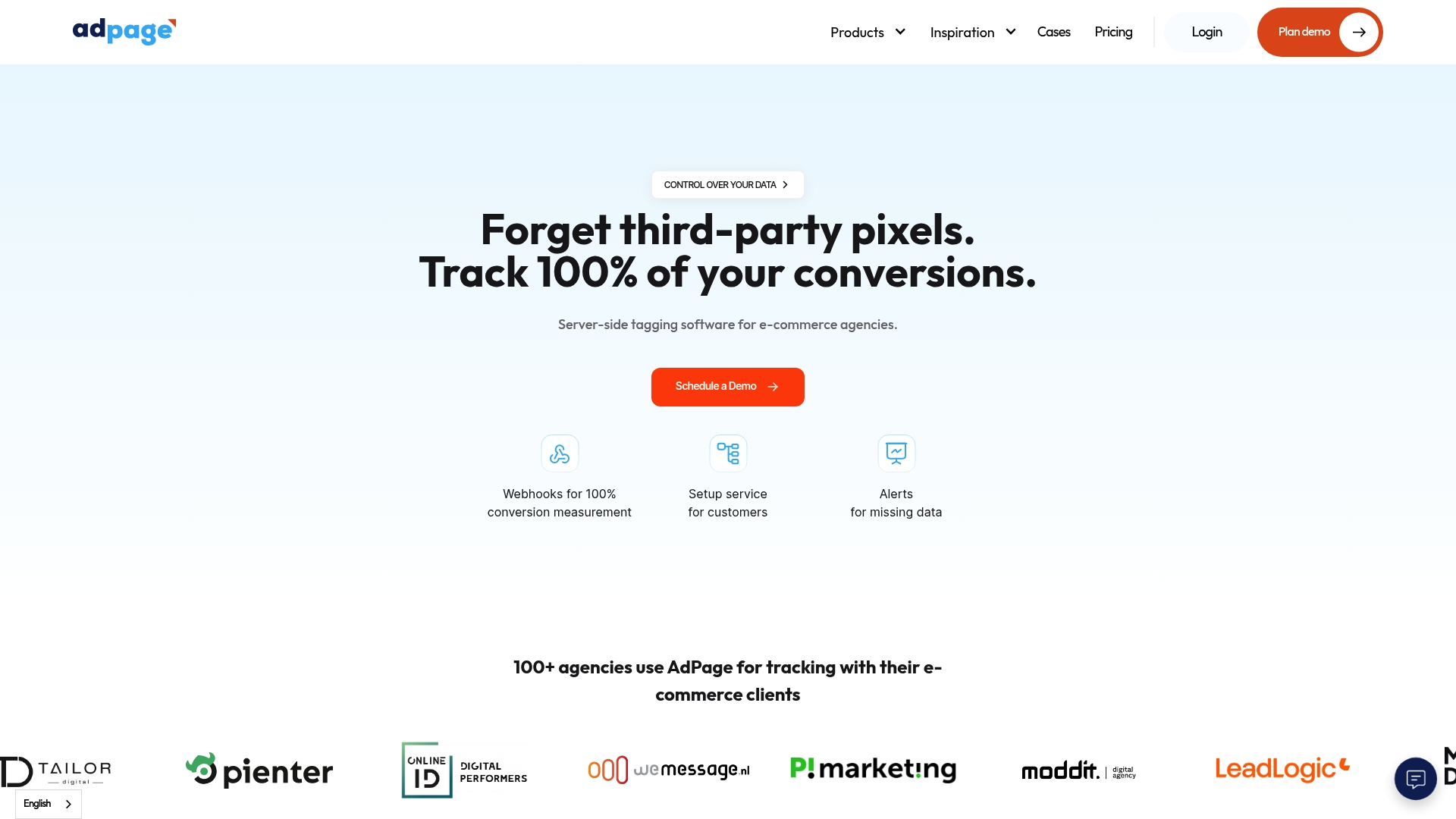Analytics is racing ahead in e-commerce and marketing faster than anyone imagined. By 2025, AI-driven automation could slash product development cycles by 50 percent and lower costs by 30 percent. Sounds like the robots are finally taking over, right? Strangely, the real shakeup is not about machines replacing humans but about the explosive power of instant, deeply personal insights that businesses never dreamed possible. What comes next will flip every prediction on its head.
Table of Contents
- AI And Automation Shaping Analytics 2025
- Personalized Insights For Improved Conversion Rates
- Privacy, Data Ethics, And Customer Trust In Analytics
- Real-Time Analytics For Agile Marketing Decisions
Quick Summary
| Takeaway | Explanation |
|---|---|
| AI and Automation Will Revolutionize Analytics | The integration of AI and automation technologies is set to transform how businesses analyze data, making processes more efficient and enabling rapid, predictive analytics that can significantly cut costs and time. |
| Personalization Is Essential for Conversion Rates | Advanced analytics will allow e-commerce businesses to create hyper-personalized experiences, utilizing sophisticated recommendation systems and multi-dimensional personalization strategies to boost customer engagement and conversion rates. |
| Data Privacy and Ethical Practices Are Crucial | As consumer concerns about data usage increase, businesses must prioritize transparency and ethical practices in data collection, ensuring clear consent mechanisms and robust data protection protocols to build customer trust. |
| Real-Time Analytics Are A Necessity | In the fast-paced digital marketplace, businesses must implement real-time analytics to make swift, informed marketing decisions, enabling them to track performance instantly and respond dynamically to customer interactions. |
AI and Automation Shaping Analytics 2025
The transformative power of artificial intelligence and automation is rapidly reshaping the analytics landscape for e-commerce and marketing professionals. By 2025, these technologies will fundamentally redefine how businesses collect, analyze, and leverage data to drive strategic decision-making.

Intelligent Machine Learning Ecosystems
Advanced machine learning systems are creating unprecedented opportunities for data-driven insights. Research from the Boston Institute of Analytics reveals the emergence of AutoML 3.0, which introduces domain-aware, multi-modal learning systems capable of adapting to specific data quality and regulatory constraints.
These intelligent ecosystems go beyond traditional analytics by:
- Predictive Intelligence: generating complex predictive models autonomously
- Adaptive Learning: Continuously refining analytical approaches based on new data inputs
- Contextual Understanding: Interpreting nuanced business objectives with remarkable precision
The implications for e-commerce are profound. Businesses can now develop more sophisticated tracking mechanisms that not only collect data but actively interpret consumer behavior patterns with unprecedented accuracy.
Autonomous AI Systems Transforming Business Intelligence
Enterprise analytics are undergoing a radical transformation. CDO Magazine reports that by 2025, approximately 25% of enterprises using Generative AI will launch agentic AI pilots. These autonomous systems will proactively solve complex business challenges, moving beyond reactive data analysis to predictive and prescriptive strategies.
For marketing professionals, this means AI-driven analytics that can:
- Automatically identify emerging consumer trends
- Predict customer churn with unprecedented accuracy
- Generate real-time personalization strategies
- Optimize marketing spend across multiple channels
Cost and Efficiency Revolutionized
The integration of AI and automation is not just about sophisticated analysis but also significant operational efficiency. Imperial College research indicates that AI-driven automation could reduce product development lifecycles by 50% and cut costs by 30% across various sectors.
For e-commerce businesses, this translates into more agile, responsive analytics infrastructures that can rapidly adapt to changing market conditions. Machine learning algorithms will enable businesses to process vast amounts of data in milliseconds, generating insights that would have taken weeks or months using traditional analytical methods.
The future of analytics is not about collecting more data but understanding it more intelligently. As AI and automation continue to evolve, businesses that embrace these technologies will gain a significant competitive advantage in an increasingly data-driven marketplace.
Prepare for a new era where analytics becomes a dynamic, intelligent ecosystem that anticipates needs, predicts outcomes, and drives strategic decision-making with unprecedented precision.
Personalized Insights for Improved Conversion Rates
Personalization has emerged as a critical strategy for e-commerce businesses seeking to enhance conversion rates and customer engagement. By 2025, advanced data analytics will enable unprecedented levels of individualized customer experiences that go far beyond traditional segmentation approaches.
Advanced Recommendation Systems
Cutting-edge research from ArXiv revealed remarkable improvements in recommendation systems using large language models. The study demonstrated significant metric enhancements: precision increased from 0.75 to 0.82, recall from 0.68 to 0.77, and average click-through rates rose from 0.56 to 0.63. These advancements represent a quantum leap in understanding and predicting customer preferences.
Modern recommendation technologies now incorporate multiple data dimensions:
- Behavioural Tracking: Analyzing real-time user interactions
- Contextual Understanding: Interpreting nuanced customer preferences.
- Predictive Modeling: Anticipating potential purchase interests
E-commerce platforms can now create hyper-personalized experiences that feel genuinely tailored to individual consumers, dramatically improving engagement and conversion potential.

Multi-Dimensional Personalization Strategies.
Another groundbreaking study introduced Style4Rec, a transformer-based recommendation system integrating product image styles and shopping cart information. The research showed impressive performance improvements: Hit Rate@5 increased from 0.681 to 0.735, and Normalized Discounted Cumulative Gain@5 rose from 0.594 to 0.674.
This multi-dimensional approach allows businesses to understand customer preferences through:
- Visual style preferences
- Historical purchasing patterns
- Contextual shopping behavior
- Real-time interaction data
By synthesizing these complex data points, businesses can create recommendations that feel genuinely intuitive and personally relevant.
Ethical Personalization and Consumer Trust.
While personalization offers tremendous opportunities, maintaining consumer privacy and trust remains paramount. Advanced analytics must balance precision with transparency, ensuring customers understand how their data contributes to their experience.
Successful personalization strategies in 2025 will prioritize:
- Clear consent mechanisms
- Robust data protection protocols
- Granular user control over data usage
- Demonstrable value exchange for shared information
The future of conversion rate optimization lies not in invasive tracking, but in creating genuinely valuable, personalized experiences that customers appreciate and voluntarily engage with.
Businesses that master this delicate balance between technological capability and user respect will emerge as leaders in the evolving e-commerce landscape. Personalization is no longer a competitive advantage it is rapidly becoming the fundamental expectation of modern digital consumers.
Privacy, Data Ethics, and Customer Trust in Analytics.
As analytics technologies become increasingly sophisticated, the critical intersection of data privacy, ethical considerations, and customer trust has emerged as a paramount concern for businesses in 2025. The evolving digital landscape demands a fundamental reimagining of how companies collect, analyze, and leverage customer data.
Consumer Privacy Perceptions and Concerns
Pew Research reveals that 81% of Americans express significant concerns about how companies use their personal data, with 73% feeling they have little control over data collection processes. This widespread apprehension signals a critical challenge for businesses seeking to maintain customer relationships.
The growing distrust stems from multiple factors:
- Opaque Data Practices: Complex and unclear data collection methods
- Perceived Invasiveness: Concerns about excessive personal information tracking
- Algorithmic Bias: Fears of unfair treatment through automated decision-making
Businesses must now navigate a delicate balance between extracting valuable insights and respecting individual privacy boundaries. This requires transparent, consent-driven approaches that prioritize user agency and data protection.
The table below summarizes the main consumer privacy concerns, highlighting the primary issues businesses must address to build customer trust.
| Privacy Concern | Description |
|---|---|
| Opaque Data Practices | Unclear and complex data collection methods |
| Perceived Invasiveness | Excessive and intrusive personal data tracking |
| Algorithmic Bias | Fear of unfair automated decision-making |
| Lack of Control | Little ability to manage data collection process |
| Distrust in Companies | Worry about misuse and lack of transparency |
Ethical Targeting and Consent Mechanisms.
Research published in 2024 highlights the significant privacy violations perceived by consumers under current behavioral targeting practices. The study underscores the urgent need for more privacy-conscious advertising methods that provide clear opt-in mechanisms and granular control over personal data usage.
Effective ethical analytics strategies in 2025 will incorporate:
- Explicit consent frameworks.
- Comprehensive data anonymization techniques
- Real-time user control over data sharing
- Transparent algorithmic decision-making processes
Companies that demonstrate genuine commitment to data ethics will differentiate themselves in an increasingly privacy-sensitive marketplace.
Building Trust Through Responsible Data Governance
Emerging research reveals deep-seated consumer concerns about AI-driven retail applications, particularly regarding potential algorithmic biases and unfair treatment. This underscores the critical importance of developing robust, transparent data governance frameworks.
Key principles of responsible data management include:
- Providing clear explanations of data usage
- Implementing rigorous data protection protocols
- Offering meaningful opt-out and data deletion options
- Regularly auditing algorithmic decision-making processes for potential biases
Trust is no longer an ancillary consideration but a fundamental requirement for successful digital engagement. Businesses must view privacy not as a compliance checkbox, but as a core strategic imperative that directly impacts customer loyalty and brand reputation.
The future of analytics lies not in maximizing data collection, but in creating meaningful, consensual, and transparent data relationships that respect individual autonomy and foster genuine trust. Companies that embrace this approach will not only mitigate potential legal and reputational risks but also build deeper, more meaningful connections with their customers.
Real-Time Analytics for Agile Marketing Decisions
In the rapidly evolving digital marketplace of 2025, real-time analytics have transformed from a competitive advantage to an absolute necessity for businesses seeking to make swift, data-driven marketing decisions. The ability to analyze and respond to data instantaneously has become the cornerstone of agile marketing strategies.
Predictive Insights and Rapid Decision Making
Research from California Polytechnic State University highlights the critical integration of predictive and prescriptive analytics with advanced AI models. This breakthrough enables businesses to analyze massive datasets in real-time, generating insights that can be immediately translated into actionable marketing strategies.
Key capabilities of real-time analytics include:
- Instantaneous Performance Tracking: Monitoring campaign effectiveness as it unfolds
- Dynamic Audience Segmentation: Adapting targeting strategies in milliseconds
- Contextual Response Mechanisms: Adjusting marketing approaches based on immediate user interactions
Marketing teams can now react to market changes with unprecedented speed, turning data into strategic advantage within moments of collection.
Sentiment Analysis and Customer Engagement
Cutting-edge research demonstrates remarkable advancements in AI-driven sentiment analysis. These sophisticated systems, combining traditional machine learning with deep learning models, have achieved an impressive 89.7% accuracy on large-scale datasets. This breakthrough enables businesses to understand and respond to customer emotions and preferences in real-time.
The implications for marketing are profound:
- Instant emotional intelligence tracking
- Immediate content and messaging adjustment
- Personalized customer interaction at scale
- Proactive reputation management
The following table provides a clear summary of recent advancements in recommendation and sentiment analysis systems, highlighting key metric improvements.
| System/Technology | Metric | Before | After |
|---|---|---|---|
| LLM-based Recommendation System | Precision | 0.75 | 0.82 |
| LLM-based Recommendation System | Recall | 0.68 | 0.77 |
| LLM-based Recommendation System | Click-Through Rate | 0.56 | 0.63 |
| Style4Rec (Hybrid Recommendation). | Hit Rate@5 | 0.681 | 0.735 |
| Style4Rec (Hybrid Recommendation). | NDCG@5 | 0.594 | 0.674 |
| Sentiment Analysis (AI-driven) | Accuracy | - | 89.7% |
Businesses can now craft marketing messages that resonate deeply and instantly with their target audience, creating more meaningful and responsive customer experiences.
Edge Analytics and Decentralized Insights
Further research reveals the rising importance of edge analytics, which processes data directly at its source. This approach provides crucial real-time insights for complex, decentralized environments, revolutionizing how businesses collect and interpret data.
Edge analytics offers significant advantages:
- Reduced latency in data processing
- Enhanced data privacy and security
- Lower bandwidth requirements
- Immediate insights from distributed sources
For marketing professionals, this means the ability to gather and analyze data from multiple touchpoints simultaneously, creating a more comprehensive and immediate understanding of customer behavior.
The future of marketing lies in this seamless, instantaneous data ecosystem. Real-time analytics are no longer just a tool but a fundamental approach to understanding and engaging with customers. Businesses that master these technologies will not just respond to market changes they will anticipate and shape them, creating a new paradigm of proactive, intelligent marketing strategies.
Frequently Asked Questions
What are the key trends in analytics for e-commerce and marketing by 2025?
Key trends include AI-driven automation, personalized insights, data privacy considerations, and the necessity of real-time analytics for agile marketing decisions.
How will AI and automation impact marketing analytics by 2025?
AI and automation are expected to significantly enhance the efficiency of data analysis, reduce costs and product development cycles, and enable more accurate predictive modeling in marketing analytics.
Why is personalization important for e-commerce conversion rates in 2025?
Personalization enhances customer engagement by providing tailored experiences, which can significantly increase conversion rates through advanced recommendation systems and multi-dimensional personalization strategies.
What role does data privacy play in analytics for e-commerce?
Data privacy is crucial as consumers increasingly demand transparency and control over their data. Businesses must adopt ethical practices and clear consent mechanisms to build trust and comply with regulations.
Ready to Transform Your Analytics into Real Conversion Power?
Many businesses are struggling with inaccurate data, lost conversions, and the frustration of not being able to fully leverage advanced analytics, as highlighted in the article on 2025 trends. Automated insights and real-time analytics only deliver results if you can trust your data and track every user action. Stop losing conversions because your tracking is limited by browser restrictions or unreliable scripts. With privacy rules tightening and consumers demanding ethical data handling, your business cannot afford another year of guessing.

Experience the difference with AdPage's server-side tagging solutions, built for modern e-commerce needs. Gain 100 percent conversion measurement, uphold GDPR compliance, and enjoy seamless integrations with platforms like Shopify and WooCommerce. Take control of your data accuracy and empower your marketing team to act on insights, not assumptions. Visit AdPage today and discover how you can close the analytics gap before your competitors do.



.png)
